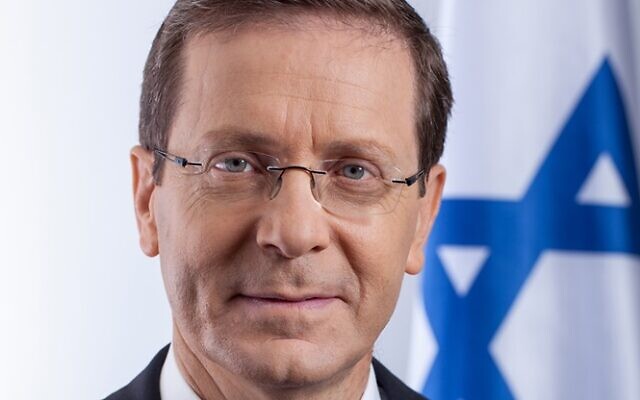U.S. Plans for Two-State Solution Appear Stymied
November IDI survey shows Israelis split on the formula.

In anticipation of his meeting with a high-ranking U.S. official in mid-December, Israeli President Isaac Herzog told The Associated Press that it was premature to speak about the creation of a Palestinian state alongside Israel. Talking about a potential two-state solution so soon after the surprise Hamas attack on Israel on Oct. 7 is inappropriate, he said.
“What I want to urge is against just saying two-state solution. Why? Because there is an emotional chapter here that must be dealt with. My nation is bereaving. My nation is in trauma,” said Herzog who fills essentially a ceremonial role. “In order to get back to the idea of dividing the land, of negotiating peace or talking to the Palestinians, etc., one has to deal first and foremost with the emotional trauma that we are going through and the need and demand for full sense of security for all people.”
His stance reflects a survey conducted by the Viterbi Family Center for Public Opinion and Policy Research at the Jerusalem-based Israel Democracy Institute. The question posed was whether Israel should agree or disagree to pursue the two-state solution in order to continue to receive American assistance.
“President [Joe] Biden has repeatedly stated that the large-scale assistance Israel is receiving from the United States is dependent on progress toward a fundamental solution of the Israeli-Palestinian conflict, on the basis of the two-states-for-two-peoples formula. In your opinion, after the war, should Israel agree or not agree to pursue this direction?”
According to the IDI, the Jewish sample revealed that a majority (75 percent) of Jewish Israelis on the political left said they support making progress toward a two-state solution to the conflict in return for American assistance, “as part of the plan put forward by U.S. President Joe Biden.” In the political center, a large minority (45 percent) agreed, while on the right, only a small minority (21 percent) agreed.
My nation is bereaving. My nation is in trauma. In order to get back to the idea of dividing the land, of negotiating peace or talking to the Palestinians, etc., one has to deal first and foremost with the emotional trauma that we are going through and the need and demand for full sense of security for all people.
The survey was conducted during the week at the end of November when Hamas was freeing about 100 hostages taken from Israel on Oct. 7, in exchange for approximately three times that number of Palestinian prisoners in Israeli jails. The timing might be notable in that Israelis were feeling somewhat more optimistic while seeing their loved ones released from captivity in Gaza.
Indeed, the Israeli Voice survey found a rise in public optimism about both the future of Israel’s security and the future of democratic rule in Israel – the latter being the main source of division in the country in 2023 before the Oct. 7 massacre.
“This trend, seen by some as a form of ‘rallying to the flag,’ has also been found in other countries in wartime when the state is able to demonstrate what are seen as successes on the battlefield with a relatively low number of casualties among its own forces.”
That finding might change by the end of December as an increasing number of Israel Defense Forces soldiers have been killed since the November survey was taken, along with the end, at press time, of an exchange that allowed live hostages to be released. Rather, the IDF has retrieved only the bodies of some hostages, and on Dec. 15 the IDF reported the tragic shooting by its soldiers of three hostages reportedly waving a white flag and expecting to be freed by their countrymen.
Prior to Oct. 7, there had not been any serious negotiations between Israel and the Palestinians to attain a two-state solution for nearly a decade. Israelis lost a sense of security on Oct. 7 when Hamas terrorists and its allies easily breached Israel’s border and killed at least 1,200 people, mostly civilians, and abducted some 240 more people. Israel counter-attacked from the air and soon after with a ground incursion, killing, according to the Hamas-run Gazan Health Ministry, more than 18,000 Palestinians.
The Biden Administration, which Israelis believe has been both emotionally and militarily supportive of the country, has reiterated its belief that negotiations toward a two-state solution must be renewed after the war, under the leadership of the Palestinian Authority which rules parts of the West Bank.
Israeli Prime Minister Benjamin Netanyahu has stated emphatically that his right-wing government will not support placing the Palestinian Authority in charge of Gaza. Even though the Biden Administration has urged Netanyahu to plan for the “day after” the war, the Israeli government has not described its plans for the Palestinian enclave.
In fact, some members of his government have even suggested that Israel rebuild settlements on the Gaza Strip, which Israel has dismantled in 2005.
Israel’s Heritage Minister Amichai Eliyahu was reported as saying Dec. 15 that Israel “should fully occupy the Gaza Strip” after the war and develop settlements on the strip of land where some two million Palestinians live.
However, an early December Hebrew University of Jerusalem survey showed that a significant majority of Israelis (56 percent) oppose annexing and resettling Gaza, while 33 percent support such a move and 11 percent remain uncertain about their opinion on this issue.
- Israel news
- politics
- Jan Jaben-Eilon
- President Isaac Herzog
- hamas
- Viterbi Family Center for Public Opinion and Policy Research
- Israel Democracy Institute
- Joe Biden
- Two-State Solution
- Israeli Voice
- Israel Defense Forces
- Gazan Health Ministry
- Palestinian authority
- West Bank
- Benjamin Netanyahu
- Heritage Minister Amichai Eliyahu
- Hebrew University of Jerusalem



comments